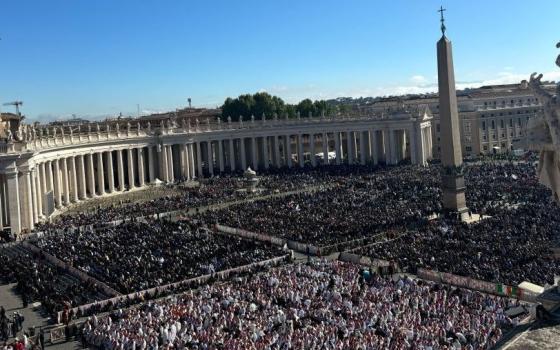Look at your Advent calendar. Can you spot John the Baptist with his 100 percent organic outfit and odd, non-vegetarian diet? Although he hardly fits the cute calendar images, he's a key character of the Advent season. His warning that it's time to change our behavior may sound a bit like "You'd better watch out ... you'd better not pout ..." but the reward he promises for conversion is not at all like a tinseled tree surrounded by toys and electronics.
 John is indeed promising a reward, but it's one that only the needy and the converted will really appreciate. Right in line with the prophets before him, John calls people to get ready to meet God on their path. God, he says, is preparing something so new that it can only be compared to a refinement by fire -- and they'll be baptized in it. That means there's a lot in their lives that needs to be blown away by the winnowing wind of the Spirit.
John is indeed promising a reward, but it's one that only the needy and the converted will really appreciate. Right in line with the prophets before him, John calls people to get ready to meet God on their path. God, he says, is preparing something so new that it can only be compared to a refinement by fire -- and they'll be baptized in it. That means there's a lot in their lives that needs to be blown away by the winnowing wind of the Spirit.
| Second Sunday of Advent |
| Isaiah 11:1-10 Psalm 72 Romans 15:4-9 Matthew 3:1-12 |
John proclaims this message most directly to the overtly religious types who show up on his riverbank. Lest the crowds think that his is simply another religious show like the sacrifices that fattened the priests and their purses, John calls out the leaders with the demand that they produce something worthwhile and not count on their baptismal certificate or Abrahamic lineage to give them an "admit one free" pass on the work of salvation.
John's preaching echoes Isaiah, his predecessor in prophecy, and puts an extra sharp edge on the message. But even Isaiah's beautiful promises demand more than we might note at first glance.
Today, we hear Isaiah announce the coming savior, someone who will rise out of the ruins of a once great, now defeated religious people. The one to come will be an ideal leader, someone whose profound love and reverence for God will be supplemented by gifts of insight and the ability to enforce justice. The proof of this leader's absolute impartiality will be that the poor and afflicted are treated with genuine justice.
If we really want to appreciate Isaiah's promises, we need to step out of our own comfortable loafers and imagine walking in the worn out sandals of people who have nothing but hope. In order to glimpse the faces and feet of some of our neediest sisters and brothers, we need only look at our newspaper, Google "Syrian refugees," or go to the website of the United Nations High Commission on Refugees (www.unhcr.org) and look up Sudan.
In these days of Advent, surrounded as we are by glitter and glitz, we need to gaze upon the people pictured there. Seeing them, we can try to listen with their ears to Isaiah's words about the one who will bring justice. It is for such as these that the promised Messiah was to come. The question we must ask is whether we can share their hopes for the coming of God's justice. If we can, we'll receive their reward with them.
There are 21 days left until Christmas. In these pre-Christmas days, a time culturally devoted to enjoying the company of friends and thinking of what gifts to give to those we love, we are called to celebrate Advent as an integral part of the holiday season. That means that we not only think of our guest lists and menus, but also dedicate time to consider those whom we can never invite because they are so far away -- geographically, economically or psychologically.
Once we have contemplated them and their plight, we can pray for them, aware -- better said, forewarned -- that God may work through our prayer in unexpected ways.
We might say that Advent invites us to consider God's wish list with as much attention as we put into finding the right presents for others. Isaiah, Paul and John the Baptist all talk about God's hopes. Isaiah says that God wants us to yearn for and accept the Spirit who offers the gifts of wisdom, understanding, counsel, strength and fear of the Lord. Those are the capacities needed to create the community Paul envisions, a community that attracts others to know and glorify God. The Baptizer then calls us to take all of those lofty ideals and make them as concrete as the fruits of the trees to which the world looks for nourishment.
We don't have to live like John the Baptist to be an Advent people, but we do need to listen to his message. He's telling us the time is always short for those in need. God is waiting on our roads, disguised in the people who have nothing left but hope. We'd better watch out!
[Mary M. McGlone is a Sister of St. Joseph of Carondelet and a historical theologian currently writing the history of the Sisters of St. Joseph in the United States.]




